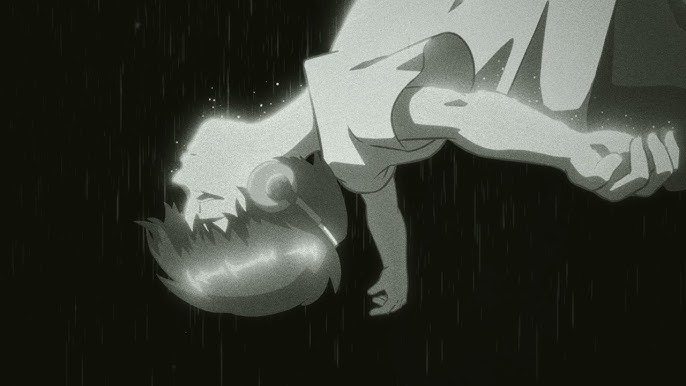Two bards have crossed paths to share their sorrow, lamenting a world that relentlessly pours down rain upon them, even as they leap skyward, to rise higher than anyone else. Rain, a recurring motif in their past songs, has often embodied their pain and the despair they carry within.
In Tablo’s song Rain Again Tomorrow, rain symbolizes recurring anxiety and emotional burdens. It represents the heaviness of repetitive days, unresolved struggles, and melancholy. Each repetition of “비가 온대 내일도“ (“It will rain again tomorrow”) underscores the inescapability of this emotional storm. Rain for him is not merely weather; it is a metaphor for the continuous turmoil Tablo experiences.
For RM, rain recurs frequently in his lyrics, most poignantly in his magnum opus, Forever Rain. On the surface, RM seems to treat rain as an emotional refuge, gentle and comforting. But in fact, rain isn’t comforting in itself; rather, it feels companionable because his internal loneliness and despair run so deep that even something as impersonal and cold as rain becomes a welcome presence. It mirrors his own sadness, quietly acknowledging his pain without judgment or expectation. Essentially, the rain’s appeal is a reflection of his emotional state: it isn’t genuine comfort, but rather a symptom of isolation, where even a melancholy presence is preferable to feeling alone. At the end of the song, RM pleads for rain to fall endlessly because he’s resigned to the reality that his emotional pain and isolation aren’t going to vanish. Instead of hoping for change or relief, he seeks permanence in the rain, choosing to embrace the sadness itself as his sole comfort.
In Stop the Rain, unlike in Forever Rain, the rain is something RM actively struggle against. For both Tablo and RM, it represents the inescapable flood of internal suffering and the scars of being misunderstood. The rain is not gentle or poetic, but brutal and relentless. It is a metaphor for depression, intrusive thoughts, and the residue of a life marked by guilt and disillusionment. They don’t seek solace in it; they’re desperate to stop it. It drenches them with memories they’d rather forget and feelings they’d rather escape. Yet despite their efforts, the storm continues, suggesting that pain, like rain, is often beyond one’s control: uninvited, unrelenting, and personal.
While listening to Tablo lament—“Can’t run away from the pain / I feel like I’m goin’ insane / Bad thoughts fillin’ up my brain…Can’t run away from the pain”—I couldn’t help but recall what he endured over a decade ago. In the early 2010s, anonymous keyboard warriors, fueled by irrational anger, created a website with the sole purpose of harassing Tablo, one of RM’s musical role models. They claimed that a mere rapper like Tablo could not possibly have scored a perfect verbal SAT score or graduated from Stanford University with a degree in English Literature in just three years (he spent another six months at Stanford, earning a Master’s in Creative Writing). At first, no one paid much attention. But the site grew like a monster, eventually amassing over 200,000 members and turning public opinion against him. The baseless conspiracy spread like wildfire, painting Tablo as a fraud who had fabricated his academic credentials.
With the world against him, Tablo found himself unable to make music. Most devastating of all, his father passed away, his health broken under the weight of stress and sorrow caused by the ordeal. In a desperate attempt to reclaim his truth, Tablo returned to Stanford with a television crew, filming a documentary that included interviews with former professors and classmates. But even this proof was dismissed by the cyberbullies as an elaborate hoax complete with fake reporters and actors. The website’s following only grew. As a final measure, Tablo filed a complaint with the Prosecutor’s Office. The perpetrators were eventually identified, arrested, and incarcerated or received probations. And yet, even with justice served, the trauma lingers. Tablo continues to carry the scars of that relentless and senseless attack.
In his song 개화 (Lost One), Tablo speaks to his daughter with aching honesty, confessing that his pursuit of dreams—of immortality and peace—brought not fulfillment, but sorrow. His ambition, once radiant, ended in shadows, even costing a life within the family. “I lost one too many things / They took everything from me,” he mourns. With heavy regret, he offers a heartbreaking plea to his daughter: Don’t be like me. Make sure your dream is modest and unseen.
RM, too, has walked through his own storms, his pain etched into every track of his first mixtape, RM, where vulnerability and rage intertwine. He recounts how his love for rap—once a source of salvation—has become a battleground, where authenticity is questioned and motives misread. The pain of being misunderstood, even vilified, by both underground purists and mainstream critics bleeds through his bars. “They say I sold out / That I abandoned the mic / But this was the only way I could keep holding on.” The mixtape lays bare a young man haunted by insecurity, questioning his worth, his path, and whether his voice has a place in the world.
RM’s reference to the 27 Club in the song—“When I was a kid / I was convinced that I was destined for the 27 Club”—is a raw confession of how he struggled with mental health in his younger years. The 27 Club, a cultural symbol of tragic early death, includes artists like Kurt Cobain (I still remember exactly where I was, what I was doing, how the air smelled, the feel of the weather when I first heard of his suicide, for he was larger than life for young people in the early ’90s), Amy Winehouse, Jimi Hendrix, Janis Japlin, and Jim Morrison, brilliant but tormented souls lost to depression or self-destruction at age 27.
By invoking this myth, RM isn’t glorifying it; he’s exposing how familiar he once felt with despair. It reflects a time when he saw self-erasure as a possible outcome of his pain. It’s a startlingly honest admission of the darkness he wrestled with beneath the surface of fame and creative success. And in the context of the song, it underscores just how much the “rain” he’s trying to stop isn’t just metaphorical: it’s the weight of a life once nearly surrendered.
“Can’t run away from the pain,” RM and Tablo confess, yet still they try, still they hope. In a way, Stop the Rain is not merely a song; it is a prayer for stillness after the storm. I, too, hope they get their wish, just as I do for anyone out there carrying deep scars that time has yet to heal. May the rain finally lift, and may peace find its way to you.
P.S.
There is only one Korean phrase in the lyric: “다시 덫 뒤에 덫.”
다시 (dah-si): again, repeat
덫 (duht): a snare or trap (metaphorically, emotional or psychological entrapment)
뒤에 (dwih-eh): behind, following
The phrase translates to “a trap behind another trap.” In the context of Stop the Rain, RM uses this line to evoke the feeling of being ensnared in a relentless cycle of emotional and psychological struggles, escaping one hardship only to fall into another. Coming after lines about loss and disillusionment (“All the lost was a lust / Dust into dust / Stray after stable”), this phrase underscores the repetition of suffering. Even when he thinks he’s found stability, there’s another hidden pitfall waiting.

